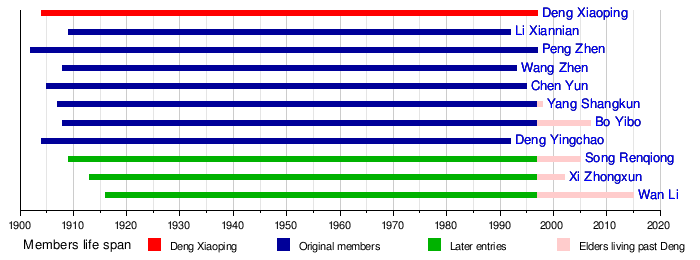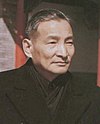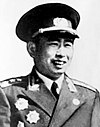The Eight Great Eminent Officials (Chinese: 八大元老; pinyin: Bā dà yuánlǎo), abbreviated as the Eight Elders (Chinese: 八老; pinyin: Bā lǎo), were a group of elderly members of the Chinese Communist Party (CCP) who held substantial power in the last two decades of the 20th century. In the English-speaking world, these men are often called The Eight Immortals as an allusion to the Taoist deities commonly known as the Eight Immortals.
Deng Xiaoping, who emerged as China's top leader in December 1978, as a result of the 3rd Plenary Session of the 11th Central Committee, was the most powerful of the group, but his power was never absolute, and he had to consult and make compromises with the other seven Elders, of whom the most prominent were Chen Yun and Li Xiannian (considered the second and third in power, respectively, and both associated with the leftist hard-liners and opposition to reform and market-oriented economy). Deng's allies among the Elders included Yang Shangkun and Peng Zhen. By the late 1980s, all Elders, including Deng himself, were united in opposition to further political reforms, while holding different views on economic and foreign affairs.
According to reformist General Secretary Zhao Ziyang, of all the Elders, Li Xiannian was the most prominent, most active and most successful in opposing and blocking changes and reforms in both political and economic issues. Important decisions were often made in Deng's home. The Eight Elders were able to remove three Party leaders. Hua Guofeng was gradually removed from Premier and Party chairman between 1980 and 1981; Hu Yaobang was removed in 1987; and, Zhao Ziyang was removed in 1989. Deng, the core of the eight Elders, retired after the 5th Plenary Session of the 13th Central Committee (November 1989), when he resigned from his last official title (Chairman of the Central Military Commission), and the rest of the Elders officially retired after the 14th Party Congress in October 1992 when the Central Advisory Commission was abolished. They still held decisive influence behind the scenes until Deng's death in February 1997.
Membership
The membership was never formally stated. With Deng Xiaoping as the main holder of power, the eight elders are accepted to include:
- Timeline of the life span of members

Descendants
Descendants of the eight Elders who have benefited significantly from nepotism and cronyism constitute a group now known as "the Princelings" or the "Crown Prince Party". Its members, rising through party ranks, can easily overrule any opposition in their jurisdictions, even if they are assigned to a local administrative position. They are often seen to outrank other party officials and possess greater prestige due to their lineage. Bloomberg has reported on the extensive wealth accumulated by these descendants via their roles in various public and private companies.
Notes
| No. | LA Times 1992 | Tkacik 2004 | SCMP 2008 | Bloomberg 2012 | Andrésy 2015 | Bendini 2016 |
|---|---|---|---|---|---|---|
| 1 | Deng Xiaoping | Deng Xiaoping | Deng Xiaoping | Deng Xiaoping | Deng Xiaoping | |
| 2 | Yang Shangkun | Yang Zhangkun | Yang Shangkun | Yang Shangkun | Yang Shangkun | |
| 3 | Chen Yun | Chen Yun | Chen Yun | Chen Yun | Chen Yun | |
| 4 | Li Xiannian | Li Xiannian | Li Xiannian | Li Xiannian | Li Xiannian | |
| 5 | Peng Zhen | Peng Zhen | Peng Zhen | Peng Zhen | Peng Zhen | |
| 6 | Wang Zhen | Wang Zhen | Wang Zhen | Wang Zhen | Wang Zhen | |
| 7 | Bo Yibo | Bo Yibo | Bo Yibo | Bo Yibo | Bo Yibo | |
| 8 | Song Renqiong | Song Renqiong | Song Renqiong | |||
| 8 | Deng Yingchao | Deng Yingchao | Deng Yingchao | |||
| Others | Xi Zhongxun | Xi Zhongxun | ||||
| Wan Li |
References
- Joseph, William A. (2010). Politics in China: An Introduction. Oxford: Oxford University Press. p. 112. ISBN 978-0-19-533530-9.
- Zhao, Ziyang (May 19, 2009). Ignatius, Adi; Pu, Bao; Chiang, Renee (eds.). Prisoner of the State: The Secret Journal of Premier Zhao Ziyang. Simon and Schuster. ISBN 978-1-4391-5407-6.
- MacFarquhar, Roderick. "Foreword" in Zhao Ziyang (2009). Prisoner of the State: The Secret Journal of Zhao Ziyang. New York, NY: Simon and Schuster. ISBN 1-4391-4938-0
- ^ Xiang, Lanxin (April 20, 2012). "Bo Xilai probe shows up China's outdated system of government". South China Morning Post
- ^ Wu, Vivian (December 1, 2008). "The 'eight immortals' who jockeyed for control of a nation". South China Morning Post. Archived from the original on June 11, 2018. Retrieved September 18, 2021.
- ^ Tkacik, John (September 2004). Scobell, Andrew; Wortzel, Larry (eds.). "CIVIL-MILITARY CHANGE IN CHINA: ELITES, INSTITUTES, AND IDEAS AFTER THE 16TH PARTY CONGRESS. Chapter 5: Premier Wen and Vice President Zeng: The "Two Centers" of China's "Fourth Generation"" (PDF). Strategic Studies Institute, U.S. Army War College. Archived (PDF) from the original on August 22, 2020. Retrieved September 18, 2021.
- ^ "Mapping China's Red Nobility". Bloomberg.com. Graphics: Chloe Whiteaker, Fan Wenxin, Michael Wei, Danny Dougherty and Phil Kuntz. Reporting: Michael Forsythe, Shai Oster, Dune Lawrence, Natasha Khan and Henry Sanderson. Retrieved September 18, 2021.
{{cite news}}: CS1 maint: others (link) - ^ Holley, David (January 12, 1992). "'Eight Elders' Wield Power Behind the Scenes in China". Los Angeles Times. Archived from the original on September 29, 2020. Retrieved September 18, 2021.
- ^ Andrésy, Agnès (November 20, 2015). Xi Jinping: Red China, The Next Generation. UPA. p. 142. ISBN 978-0-7618-6601-5.
- ^ Bendini, Roberto (June 2016). "The Cultural Revolution in China: its 50th anniversary was ignored but its legacy lives on today" (PDF). europarl.europa.eu. Archived (PDF) from the original on September 11, 2016. Retrieved September 18, 2021.
- "Heirs of Mao's Comrades Rise as New Capitalist Nobility". Bloomberg. Archived from the original on December 27, 2012. Retrieved December 28, 2012.
External links
- AsiaWeek article
- John Ruwitch 'China's leaders tug strings of power in retirement' (Reuters)









